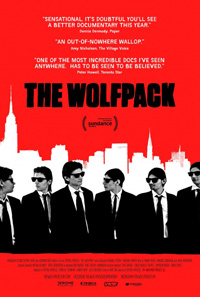Voyeuristic & Bizarre: A Look Into a Litter of Brothers and Their World of Movies
 As an exemplar of the term “stranger than fiction”, The Wolfpack’s sensation rests heavily upon its subject: a group of brothers cloistered away in their Lower East Side apartment. And with their long locks and strict patriarch, they are reminiscent of a fairy tale, kept separate from the outside world of which they have come to know only through their movies. A rather fortuitous find for Crystal Moselle, to her credit, The Wolfpack is a clearly a product of perseverance as both a foundation of trust had to be built and carried through as filming took place over five years. As a result, this is an intriguing and voyeuristic look into a family behind locked doors, allowing the audience to gawk at the complete oddity of the situation though withholding some of the pieces of the puzzle for itself.
As an exemplar of the term “stranger than fiction”, The Wolfpack’s sensation rests heavily upon its subject: a group of brothers cloistered away in their Lower East Side apartment. And with their long locks and strict patriarch, they are reminiscent of a fairy tale, kept separate from the outside world of which they have come to know only through their movies. A rather fortuitous find for Crystal Moselle, to her credit, The Wolfpack is a clearly a product of perseverance as both a foundation of trust had to be built and carried through as filming took place over five years. As a result, this is an intriguing and voyeuristic look into a family behind locked doors, allowing the audience to gawk at the complete oddity of the situation though withholding some of the pieces of the puzzle for itself.
The story itself is bizarre but the fact that it’s nonfiction, makes it even more remarkable. The Angulo family: six brothers close in age (Bhagavan, Govinda, Narayana, Mukunda, Krsna, and Jagadisa), sister (Visnu), mother (Susanne), and father (Oscar) spend almost every moment in a small cramped apartment. Homeschooled by their doting mother, their education is supplemented by their devotion to movies (at least 5,000 of them), supplied generously by their omnipotent father whose hovering presence is felt mostly through the brothers’ recounting and the accompanying home movies which eerily fit as if recreated specifically for the documentary. If it seems contradictory that their father would not let them venture outside due to his fear they be corrupted by drugs and violence, but would allow them to watch films from the notorious Quentin Tarantino (one of their favorites), it probably is. Aside from Oscar’s few segments in between as he speaks on his own behalf, the rest of the family tries to articulate exactly how they got to this point. It’s clear that the brothers feared him when they were younger and even though they are older, the fear has not yet completely subsided. Susanne, indicates that she too was at a position of lesser power–the claustrophobic tension between all of the family members is felt throughout, threatening to boil over though not captured on camera.
There is a real charm to the earnest recreations of the movies that the Angulo brothers hold so dear. Their imaginations only limited by their resources and narrow hallways, they create sets out of cardboard, prop guns, and an impressive full-bodied Batman suit made out of cereal boxes and yoga mats. Their connection to the outside world is through what they see on the screen and yet that connection is ultimately falsified. Dressed in leather jackets, sunglasses, and ties, the brothers look as if they just stepped out of a Tarantino flick (they even sound like one too, borrowing the twang and dialogue). But even more unnerving is when after a visit to the local cineplex, one of the brothers becomes paranoid, proving their disconnect but also that even though they are slowly pulling away from their father, they are still under his thumb.
Moselle sure has made a name for herself with this debut, having nabbed the Sundance Grand Jury Prize. Coming across the Angulo brothers is equivalent to winning the lottery but also navigating and incubating such a layered and personal story is an achievement in itself. The docu does lose some effect as it relies mostly on the brothers recounting and explaining rather than allowing the audience witness them going through these motions along with them. Many questions arise that are left by the wayside as if to tease: when exactly did they start venturing out, why didn’t Oscar try harder to stop them? If it weren’t for such an interesting subject to gaze upon, these gaps can leave some audience members more baffled than intrigued. Ultimately though, The Wolfpack offers a tangible honesty as the family shares their story with a world beyond the screen via a screen–the irony not lost on any of them.
★★★★/☆☆☆☆☆


